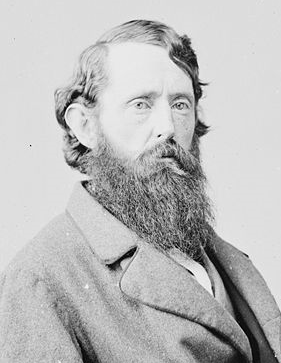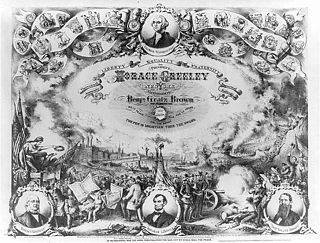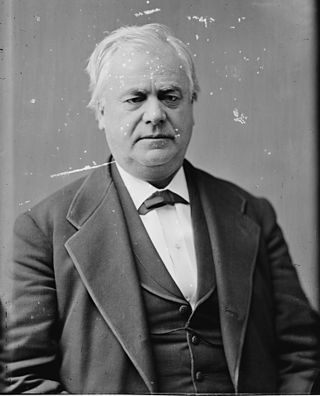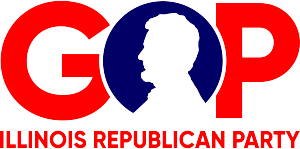
Presidential elections were held in the United States on November 5, 1872. Incumbent President Ulysses S. Grant, the Republican nominee, defeated Democratic-endorsed Liberal Republican nominee Horace Greeley.

Benjamin Gratz Brown was an American politician. He was a U.S. Senator, the 20th Governor of Missouri, and the Liberal Republican and Democratic Party vice presidential candidate in the presidential election of 1872.

The Liberal Republican Party was an American political party that was organized in May 1872 to oppose the reelection of President Ulysses S. Grant and his Radical Republican supporters in the presidential election of 1872. The party emerged in Missouri under the leadership of Senator Carl Schurz and soon attracted other opponents of Grant; Liberal Republicans decried the scandals of the Grant administration and sought civil service reform. The party opposed Grant's Reconstruction policies, particularly the Enforcement Acts. It lost in a landslide, and disappeared from the national stage after the 1872 election.

Richard James Oglesby was an American soldier and Republican politician from Illinois, who served three non-consecutive terms as Governor of Illinois and as a United States Senator from Illinois, and earlier was a member of the Illinois Senate, elected in 1860. The town of Oglesby, Illinois, is named in his honor, as is an elementary school situated in the Auburn Gresham neighborhood of Chicago's south side.

The Illinois Republican Party is the affiliate of the Republican Party in the U.S. state of Illinois founded on May 29, 1856. It is run by the Illinois Republican State Central Committee, which consists of 17 members, one representing each of the state's congressional districts. Once the dominant party in Illinois, the state GOP has become a minority party within the last few decades, holding little power in the state. The current chairman is Kathy Salvi, who has served since 2024.

The 1890–91 United States Senate elections were held on various dates in various states. As these U.S. Senate elections were prior to the ratification of the Seventeenth Amendment in 1913, senators were chosen by state legislatures. Senators were elected over a wide range of time throughout 1890 and 1891, and a seat may have been filled months late or remained vacant due to legislative deadlock. In these elections, terms were up for the senators in Class 3.

The 1864 Illinois gubernatorial election was the thirteenth election for this office and took place during the American Civil War. Republican governor Richard Yates did not run for re-election, but was instead elected to serve in the United States Senate. Major General Richard J. Oglesby resigned his commission to run as the Republican nominee. Congressman James Carroll Robinson was the Democratic nominee. At this time in Illinois history, the Lieutenant Governor was elected on a separate ballot from the governor. This would remain the case until the adoption of the 1970 constitution.
George H. Harlow was an American politician. Born in New York, he was originally a student of carpentry and architecture. He entered the mercantile business soon after he moved to Pekin, Illinois. In 1860, he was elected clerk of the circuit court, then co-founded a Union League of America chapter, later serving at the state level of the organization. Harlow was the personal secretary to Governor Richard J. Oglesby and oversaw Camp Butler starting in 1864. He was elected assistant Illinois Secretary of State for four years starting in 1868, then was the secretary from 1872 to 1880. After his terms expired, he traded commodities in Chicago.

The 1872 Vermont gubernatorial election took place on September 3, 1872. Incumbent Republican John W. Stewart, per the "Mountain Rule", did not run for re-election to a second term as Governor of Vermont. Republican candidate Julius Converse defeated Liberal Republican and Democratic nominee Abraham B. Gardner to succeed him.

The 1872 United States presidential election in Rhode Island took place on November 5, 1872. All contemporary 37 states were part of the 1872 United States presidential election. The state voters chose four electors to the Electoral College, which selected the president and vice president.

The 1872 United States presidential election in Illinois took place on November 5, 1872. All contemporary 37 states were part of the 1872 United States presidential election. The state voters chose 21 electors to the Electoral College, which selected the president and vice president.

The 1872 United States presidential election in Iowa took place on November 5, 1872. All contemporary 37 states were part of the 1872 United States presidential election. The state voters chose 11 electors to the Electoral College, which selected the president and vice president.

Elections were held in Illinois on Tuesday, November 3, 1936.

The 1872 Massachusetts gubernatorial election was held on November 5, 1872. Republican governor William B. Washburn was re-elected to a second term in office over businessman Francis W. Bird, a Liberal Republican nominated with support of the Democratic Party.

The 1920 Illinois gubernatorial election was held on November 2, 1920.

The 1888 Illinois gubernatorial election was held on November 6, 1888.

The 1884 Illinois gubernatorial election was held on November 4, 1884.

The 1908 Illinois gubernatorial election was held on November 3, 1908. It saw the election of Republican nominee John G. Oglesby.

The 1912 Illinois lieutenant gubernatorial election was held on November 5, 1912. Incumbent first-term Republican lieutenant governor John G. Oglesby was defeated by Democratic nominee Barratt O'Hara.
The 1891 United States Senate election in Illinois was held from January 13 to March 11, 1891. The contentious election was determined by a joint session of the Illinois General Assembly. The election went on for 154 ballots and cost the State of Illinois approximately $150,000.



















